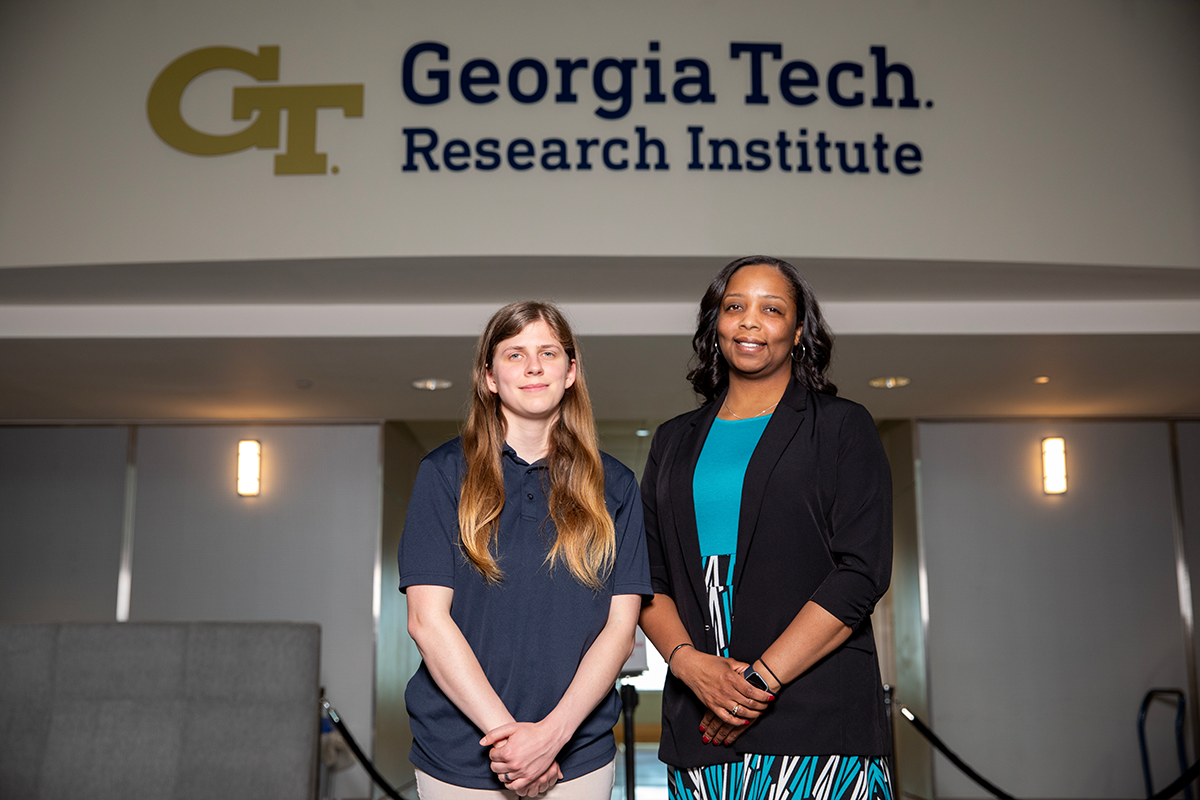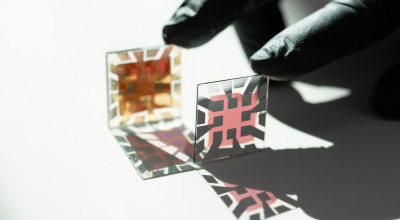
Graduate school had always been on Emily Strube’s radar, but after graduating from college in 2019, she first wanted to gain work experience and take a break from studying.
It wasn’t until Strube joined the Georgia Tech Research Institute (GTRI) as a research engineer in fall 2020 and learned about its Tuition Assistance Program (TAP), which covers tuition and fees for eligible employees who attend a University System of Georgia (USG) institution, that she decided to take the plunge.
Strube earned a master’s in computer science from the Georgia Institute of Technology (Georgia Tech) in 2023. She expects this degree will broaden her skills beyond her undergraduate degree in game design from Kennesaw State University and help her advance at GTRI.
At GTRI, Strube leads projects focused on augmented reality (AR), virtual reality (VR) and the use of Unity, a cross-platform game engine developed by Unity Technologies.
Strube in 2022 earned an internal GTRI award for leading a project that improves soldiers' awareness using AR devices and Unity software for accurate line-of-sight calculations in different environments.
“The biggest motivator for me to go back to school was the fact that it was paid for,” said Strube. “After undergrad, I wanted a break and didn’t plan to return to school immediately. But when I joined GTRI and learned they would cover my tuition, I thought, ‘I may as well just go ahead and knock it out.’”
TAP is available to full-time, benefits-eligible USG employees who have successfully completed six months of employment.
In 2023, there were 155 GTRI employees who participated in TAP.
Employees must go through the regular student admission process at their chosen institution before applying for TAP. A TAP application must be completed each semester by the deadline. Once an employee’s TAP application has been approved, they must register for classes only during the designated employee registration period.
Participants can apply to enroll in up to nine academic semester hours for each of the fall, spring and summer semesters.
“With GTRI being part of one of the greatest educational institutions in the world, I am proud that our current and future leaders can leverage educational assistance programs such as TAP,” said GTRI Chief Operating Officer and Interim sHRp Director Troy Littles. “These programs not only foster an environment of curiosity, but also expand the knowledge base of our workforce, enhancing the solutions we develop for the Department of Defense and industry partners.”
While graduate school promises career advancement, such as increased earning potential and professional networking opportunities, along with specialized expertise and personal growth, the prospect of taking on debt remains a concern for many students.
Recent estimates show that the average student loan debt for a master’s degree is over $60,990. For a doctorate, it ranges from $72,560 to $183,200. Overall, the average debt for graduate students who took out loans is $88,820.
For Sarah Cockrell, a big draw of TAP was the ability to earn two advanced degrees debt-free.
Cockrell, who serves as Georgia Tech’s director of employee development and culture, earned an M.S. in conflict management from Kennesaw State in 2023 and is currently pursuing her doctor of education at the University of Georgia (UGA). She expects to graduate from UGA in 2027.
Prior to her role at Tech, Cockrell served as GTRI’s interim organizational development manager, where she directed the division’s learning and development programs, GTRI’s learning management system, career development, and tuition reimbursement programs.
“Without TAP, I don't know if I would have had the same success in these programs because I would’ve had to figure out a way to avoid student debt,” Cockrell said.
Despite the challenges of juggling work, school and other commitments, Cockrell said she is grateful to have supportive managers and the ability to work for an organization that prioritizes professional development and work-life balance.
Cockrell looks forward to applying the knowledge and skills she has gained from her degrees to her role at Tech. She aims to foster psychological safety in the workplace and equip leaders with the essential skills to create environments where team members feel empowered to contribute their best ideas and confident in their abilities to resolve workplace conflict.
“My goal is to create a positive environment where our employees and leaders have the support and tools they need to be successful,” she said.

GTRI Senior Research Scientist Scott Appling used TAP to fund his Ph.D. in human centered computing from Tech, which he received in 2023.
Appling said the degree gave him insight into how human factors, such as cognitive bias, influence data that trains algorithms. It also equipped him with strategies to address these biases and how to use technology to empower humans to accomplish great feats.
Recently, Appling felt that he needed another degree to expand his skill set beyond the technical side of things and elevate his abilities as both a researcher and a professional.
An MBA seemed like the right choice.
Appling is enrolled in the Evening MBA Program at Georgia Tech’s Scheller College of Business and is set to graduate in 2026. TAP is also supporting this degree.
“Engaging with senior leadership and staff across various internal groups and projects, whether in formal settings or town hall discussions, has highlighted to me the importance of acquiring skill sets outside of a technical discipline,” Appling said. “These additional skills will not only enable me to advance further but also contribute to the overall success of GTRI.”
GTRI offers other educational assistance programs in addition to TAP. The Staff Tuition Reimbursement Assistance Program (STRAP) provides partial tuition reimbursement for staff attending accredited private institutions outside the USG system.
The Georgia Tech Research Corps (GTRC) is available to full-time employees with research-related titles, offering additional educational support. The GTRI Supplemental Tuition Assistance Program covers the remaining tuition and fees not supported by other programs, and assists with exclusive advanced degree programs.
More information about TAP and GTRI’s other education assistance programs can be found here: PowerPoint Presentation (gatech.edu).
Writer: Anna Akins
Photos: Sean McNeil
GTRI Communications
Georgia Tech Research Institute
Atlanta, Georgia
The Georgia Tech Research Institute (GTRI) is the nonprofit, applied research division of the Georgia Institute of Technology (Georgia Tech). Founded in 1934 as the Engineering Experiment Station, GTRI has grown to more than 2,900 employees, supporting eight laboratories in over 20 locations around the country and performing more than $940 million of problem-solving research annually for government and industry. GTRI's renowned researchers combine science, engineering, economics, policy, and technical expertise to solve complex problems for the U.S. federal government, state, and industry.



